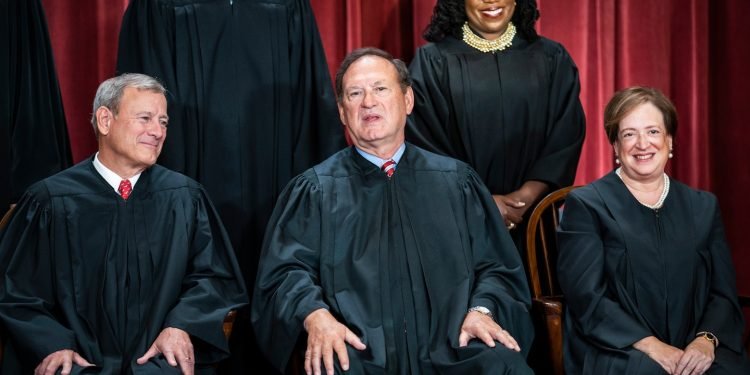Alito's Trip Inquiry by ProPublica Met with His Response in the Wall Street Journal
Supreme Court Justice Alito Responds to ProPublica's Unpublished Article in Wall Street Journal Op-Ed

Supreme Court Justice Samuel A. Alito Jr. has addressed the questions raised by investigative newspaper ProPublica regarding his trip with a politically active billionaire. In an unprecedented move, Alito defended himself in an op-ed published by the Wall Street Journal. Notably, Alito's response came before ProPublica had even published its story.
Alito's column, titled "ProPublica Misleads Its Readers," drew criticism for revealing details of ProPublica's ongoing journalism, with the assistance of the Gazette's editorial page editors. The editor's note accompanying Alito's column mentioned that ProPublica reporters Justin Elliott and Josh Kaplan had sent questions to Alito, but it failed to disclose that ProPublica had not yet released its article. Alito did not provide his responses directly to ProPublica.
The Gazette, whose editorial page operates independently of its newsroom, did not comment on the matter when approached by The Washington Post.
ProPublica ultimately published its article on Alito late Tuesday night, approximately five hours after the Wall Street Journal published Alito's defense column. The article delved into the conservative justice's relationship with billionaire hedge fund manager Paul Singer, including their trip to an Alaskan fishing resort in 2008. According to ProPublica, Singer, who had been involved in several court disputes, flew Alito to the resort on his private jet, an expense that would have exceeded $100,000 if Alito had chartered the plane himself.
ProPublica alleged that Alito violated the law by not disclosing the trip on his financial disclosure forms. The article also highlighted the role of conservative judicial activist Leonard Leo in organizing the Alaska trip, including his connection to Singer and the lodge owner, both major donors to the Federalist Society.
In his Journal column, Alito preemptively addressed the forthcoming ProPublica article. He denied any conflict of interest in accepting Singer's "hospitality" and disputed the obligation to disclose the 2008 trip. Alito claimed that Singer was a casual acquaintance, and their interaction during the fishing trip was brief. He further asserted that he was unaware of Singer's involvement in subsequent litigation.
Alito justified accepting a seat on Singer's private jet by explaining that refusing would have left him without accommodations. He argued that choosing a commercial flight would have burdened taxpayers, who would have had to cover the costs of deputy U.S. marshals accompanying Supreme Court justices for security purposes.
Additionally, Alito objected to ProPublica's portrayal of the fishing resort, describing it as deceptive. He characterized his stay at the King Salmon Lodge as three nights in a modest one-room unit with home-style meals. He refuted the notion that expensive wine was served during the trip.
Alito explained his failure to disclose the flight on his annual disclosure form, citing unclear rules at the time and stating that he followed what he understood to be the standard practice.
The Gazette's editorial page has noticeably leaned towards the right in recent years and often expresses support for conservative members of the Supreme Court. In April, the Gazette criticized ProPublica's "left-leaning" reporting on Justice Clarence Thomas, asserting that Thomas did not violate any disclosure rules and had no conflict of interest in his dealings with billionaire Harlan Crow.
ProPublica's lead reporter on the story, Justin Elliott, revealed that he and his colleagues were informed by the Supreme Court's chief spokeswoman that Alito would not comment on their article. He expressed surprise at the swift publication of Alito's column but welcomed the opportunity for substantial engagement with their questions across different platforms.

 chandni
chandni 



